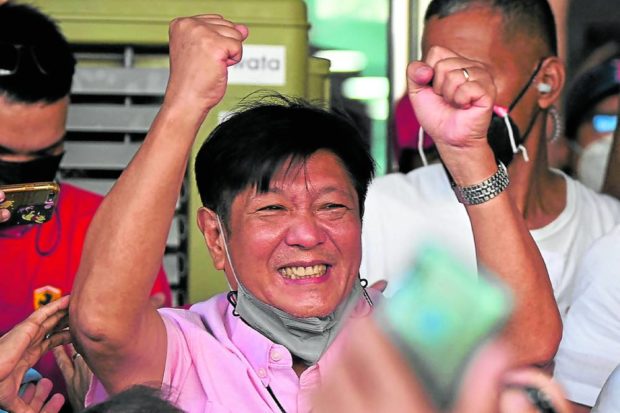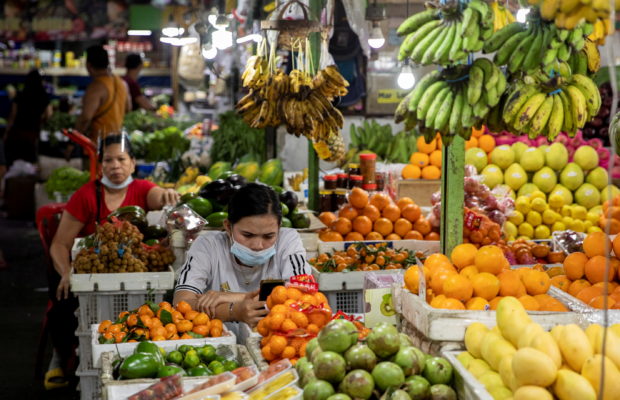Philippine economy in solid shape as Marcos set to take the helm

Presidential candidate Ferdinand Marcos Jr celebrates with supporters as he arrives at the campaign heaquarters in Manila on May 11, 2022. – The son of the late Philippines dictator Ferdinand Marcos on May 11 claimed victory in the presidential election, vowing to be a leader “for all Filipinos”, his spokesman said. (Photo by Ted ALJIBE / AFP)
MANILA, Philippines — Presumptive president Ferdinand Marcos Jr. will inherit an economy that has strongly bounced back from the COVID-19 pandemic when he takes office in June, but soaring food and fuel costs will need to be addressed quickly.
Southeast Asia’s fifth-largest economy grew a better-than-expected 8.3% in the first quarter, the government said on Thursday. It was the fastest annual growth since the June quarter of 2021 when it expanded 12.1% and exceeded a 6.6% forecast in a Reuters poll.
That growth rate made the Philippines the fastest growing economy in the East Asia Region for the period, officials said.
On a seasonally adjusted basis, the economy grew 1.9% in January-March from the previous quarter, with the easing of COVID-19 curbs and election-related spending underpinning domestic demand.
That gives the central bank scope to raise interest rates to tackle rising inflation, which threatens to dampen consumer sentiment and derail the economic recovery.
Article continues after this advertisement
FILE PHOTO: Vendors wearing face masks for protection against the coronavirus disease (COVID-19) stand by their fruit stalls at a public market in Quezon City, Metro Manila, Philippines, February 5, 2021. REUTERS/Eloisa Lopez
“Since we are doing relatively well on the economic opening as evidenced by the Q1 data, the immediate priority is to address inflation, especially those that affected people the most, food prices,” Economic Planning Secretary Karl Kendrick Chua told a news conference.
Article continues after this advertisementThe Bangko Sentral ng Pilipinas (BSP) holds its next policy meeting on May 19, with some analysts seeing higher chances for an interest rate hike.
“With GDP now back to pre-COVID levels and with inflation accelerating, we fully expect BSP to hike policy rates at the May 19 meeting,” said ING senior economist Nicholas Mapa.
Economists have raised concerns the BSP, which has kept benchmark interest rates steady since November 2020 at record lows, could fall behind the curve as central banks around the world step up monetary tightening to fight inflation.
Governor Benjamin Diokno, however, has flagged a possible hike in June, with the BSP looking at raising rates two to three times to bring down inflation by next year.
Reforms and fiscal prudence
To sustain the growth momentum, Chua also urged the next administration to pursue further tax reforms, continue fiscal prudence and boost tax revenues needed to finance infrastructure projects and human capital development.
Boosting tax revenue is crucial as Marcos must tackle the problem of heavy public debt bloated by heavy borrowings to finance the government’s pandemic measures.
“A majority mandate on top of sizable political capital opens the door for opportunities for Marcos to implement substantial economic reforms early on in his single six-year term,” ING’s Mapa said.
Marcos, who clinched a decisive victory in Monday’s election, said he would hit the ground running as president and was looking very carefully at candidates for his economic team, with infrastructure, jobs and energy prices his priorities.
Another pressing issue is the need to widen face-to-face learning as schools reopen, Chua said, a key challenge for the education department, which will be under the supervision of newly-elected Vice President Sara Duterte-Carpio, daughter of the current president.
Students have faced setbacks due to lack of access to computers and patchy internet during 20 months of online learning.
RELATED STORY: